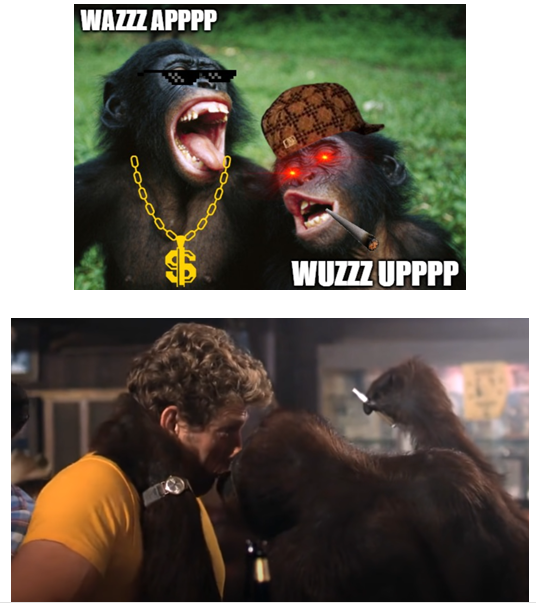The word absurd first cropped up in about 1557 as a derivative of the French absurde, based on the Latin absurdus (incongruous, dissonant, out of tune). Nowadays the adjective of the word is commonly meant to mean wildly unreasonable, unsound or incongruous or extremely silly or ridiculous.
Absurdity seems to be a staple of much American humour, a classic example being Get Smart. Get Smart was an American comedy television series parodying the secret agent genre that had become widely popular in the first half of the 1960s. It was created by Mel Brooks and Buck Henry and described as “an insane combination of James Bond and Mel Brooks comedy”. You can still see it on those channels that specialise in re-runs or on YouTube. To do so will provide you with a rich background in absurd humour.
Stan Burns and Mike Marmer were writers on Get Smart but saw an even greater opportunity as producers of a new television series titled Lancelot Link, Secret Chimp.
Lancelot Link, Secret Chimp features a cast of monkeys, mostly chimpanzees, though there were guest appearances by an orangutan, only referred to by Lancelot as “that weirdo” (obviously a ‘racist’ dog-whistle). The monkeys were given apparent speaking roles by overdubbing with Homo sapiens voices. To make the dialogue fit the monkeys’ lip action, Burns and Marmer went to ridiculous lengths. Voice-overs were ad-libbed on the set, giving birth to beautifully absurd moments of the chimps breaking into songs at the end of sentences or spontaneously reciting Mother Goose rhymes, just so it would look right.
The names of the characters were all parodies of real-life characters or other TV series or movies. For examples, Lancelot Link (played by Tonga) is probably a reference to the ‘missing link’ of anthropological meaning, just as Commander Darwin is probably a reference to Charles Darwin. Lancelot’s love interest and partner, Mata Hairi, is a play on Mata Hari of real spy fame. The list of caricatures goes on. The umbrella organisation they worked for was called APE: Agency to Prevent Evil. We can see even at this juncture, the whole setup is rife with political incorrectness – but was it also rife with animal cruelty?
Often the actors would be featured smoking. While teaching animals to smoke is now universally regarded as bad practice, the modern tobacco industry still encourages parents and children to smoke.
- Currently over eight million people a year, every year, die directly because of smoking.
To provide perspective, to date, from 2019 till 2022, about 6.35 million people have died from Covid.
To combat the global smoking epidemic, the World Health Organisation has put a whole six people onto the problem! Their team is: Dr Ruediger Krech (director), Dr Faten Ben Abdelaziz, Jeremias Paul Jr, Vinayak Prasad and Juan Tello.
When making these TV programmes and movies there were many health, safety and animal management practices that would never be tolerated today. For example, Tonga’s (Lancelot Link) first role was as Debbie the “bloop” in Lost in Space. But in season two, Tonga started biting people. As a solution the trainer had his teeth removed (replaced by dentures) and later he was castrated to make him more tractable. This was quite literally adding injury to the insult of “misgendering”!
Tonga wasn’t the only monkey to suffer indignity. Often chimps were dressed as Japanese chimps or as German chimps (with a monocle in their eye, a la Colonel Klink of Hogan’s Heroes fame). According to the Encyclopaedia of TV Pets, on one occasion a chimpanzee called Corky, dressed as an American brave, complete with head-feathers, war paint and moccasins, escaped… he couldn’t be found until he was returned later in the day by a hippie who looked much the same.
These obvious incidents of cultural appropriation, misgendering and exploitation have brought endless shame and harm to the name and peoples of Pan troglodytes!
We would all like to think that this sort of animal abuse has stopped, but, alas, it still occurs.
Tonka, like Tonga, was a monkey star. He played major roles in movies such as George of the Jungle and Buddy. Concerned for the animal’s welfare, PETA (People for the Ethical Treatment of Animals) initiated a legal battle with Tonka’s owner and animal trainer, Tonia Haddix, concerning Tonka’s wellbeing. But legal proceedings were halted when it appeared the animal had had a stroke and subsequently died of heart failure.
No so! Merely a clever ruse by the owner to avoid handing the animal over. The missing pet and actor Tonka has been found alive and well!
Tonka has become the 13th chimpanzee to be saved by PETA, saved from an impending execution (euthanasia) on 2 June, 2022. One can only hope that a long and happy retirement lies in the future.
Of course, these aren’t the only ways in which P. troglodytes have been exploited and mocked – for example Hallmark cards often feature ridiculing photos of various species of monkeys. Further, the internet is packed with monkey memes:

As well, we are all familiar with the very ‘friendly’ behaviour of Clyde the orangutan in Every Which way but Loose. Here he is smoking and kissing in a bar.
But chimpanzees seem to have been particularly singled out. Even the scientific name of chimpanzees includes innate mockery. One meaning of the word troglodyte is “a person of degraded, primitive or brutal character”.
This must stop!
Fortunately, the WHO has come to the rescue. Barely a week past the saving of Tonka, the WHO acted swiftly and affirmatively to rehabilitate the name and reputation of monkeys everywhere.
Building on the relationship between the ‘absurd’ and ‘monkeys’, the WHO have recognised that the name monkeypox is “discriminatory and stigmatising” and will now seek to rename the affliction.
It is fantastic that chimpanzees can now hold up their heads in public. They no longer need to swing from shadow to shadow.
Once again, in this clown world of political correctness, we have reality ‘APEing’ farce. I wonder, especially considering all the drama around Covid and the fact that smoking kills millions more every year, if the WHO might better spend its time and resources more productively than protecting the supposed hurt feelings of monkeys?
NZ annually contributes a million dollars to these WHO buffoons. Are we getting our mon(k)ey’s worth?

